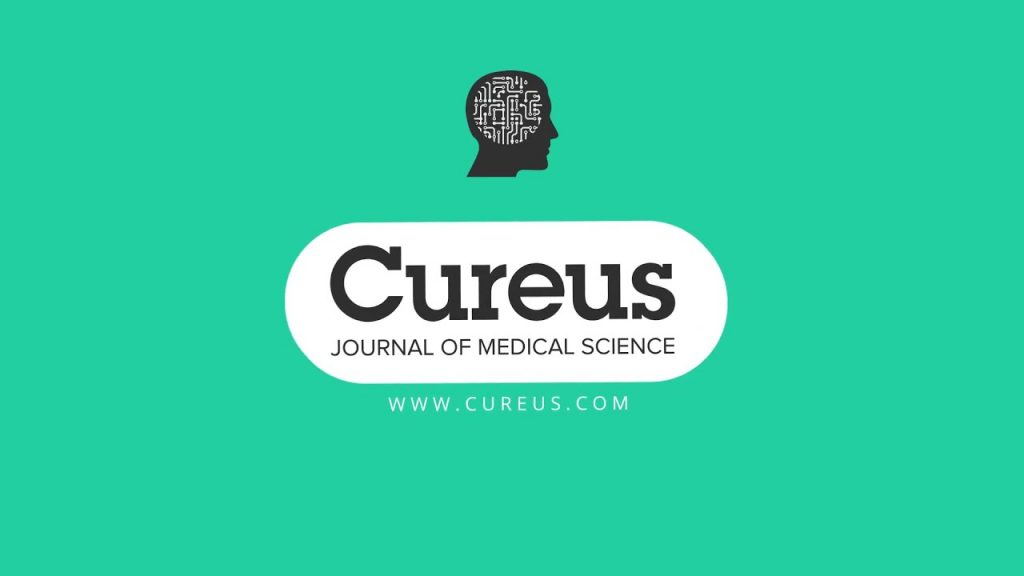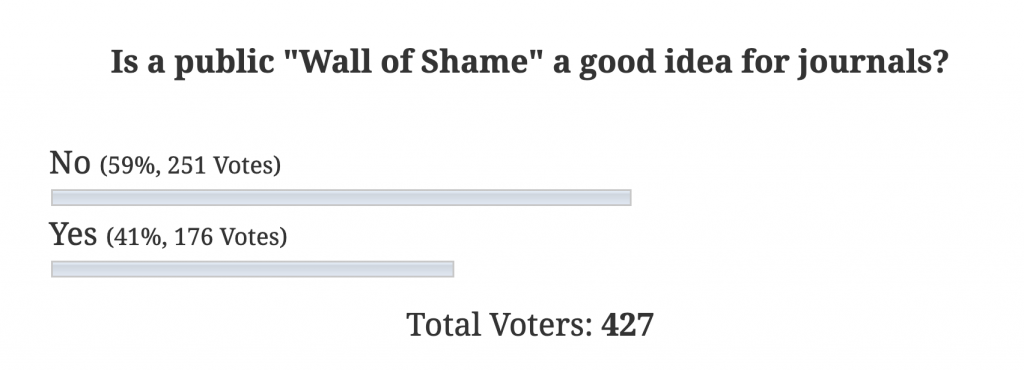
Today, the journal Cureus — which is no stranger to Retraction Watch — unveiled what they are calling a “Wall of Shame,” which “highlights authors and reviewers who have committed egregious ethical violations as well as the institutions that enabled them.”
Over the years, we’ve heard various arguments about journals going public with a list of miscreants. On the one hand, it’s a step toward transparency that might avoid other journals from being fooled. On the other, such lists can be selective, and can attract legal threats.
So let us know what you think. And leave a comment on the post about why you chose your answer. (The poll is now closed.)

Like Retraction Watch? You can make a one-time tax-deductible contribution or a monthly tax-deductible donation to support our work, follow us on Twitter, like us on Facebook, add us to your RSS reader, or subscribe to our daily digest. If you find a retraction that’s not in our database, you can let us know here. For comments or feedback, email us at [email protected].
“Offenders are selected for the Wall of Shame at the discretion of the Cureus editorial team. ”
Wow I see no room for this to be abused!
Yes – for this to be remotely defensible the inclusion criteria would have to be transparent and objective (e.g., lead and corresponding authors of editor-retracted articles).
I agree, and this is exactly why I voted “no” also. Unless the process is transparent so as to reveal any instances of unconscious (or even conscious) bias, I can only see this going really badly for underrepresented communities.
The review process is questionable? Did they check for plagirism or ask for picture permission before publishing? If no then the editors should be placed on first place on the wall of shame. You must take it down before things get nasty.
“Offenders are selected for the Wall of Shame at the discretion of the Cureus editorial team. ”
Yes, that is a problem. I am very much in favour of such a list, similar to brining back Beall’s list for predatory journals. It is important to warn real scientists about fraudsters. But, this can only work if th criteria are entirely transparent. Otherwise, there is not much point to it.
I am contractually obliged to link to this Screaming Blue Messiahs video:
I voted no. Regarding misconduct, finger-pointing exercises add nothing to the scholarly process, and can be highly detrimental to individuals. Remember the sad example of Yoshiki Sasai.
Editors have better tools to fight fraud.
I *think* RW put an article up once about an investigator who was doing suspicious things and bouncing to different institutions where his transgressions did not follow him. I don’t think a wall of shame is a good idea, but there should be record of misconduct that sticks with the investigator, at least for a bit, instead of shuffling a problem child around and wasting more time and resources.
As currently shown – with individuals making quite serious allegations of fraud and misconduct with no context of when/whether/how it was reported to the journal and when/whether/how the journal acted, no information on how the person knows this about the process and no connection to a paper or papers that are affected – this is a broad brush with serious potential for misinterpretation and worse potential for abuse.
It’s a good idea that needs to go further. The problem is Cureus being the creator of the wall of shame. Doesn’t look like they put much energy into it. Previous comments have pointed out the lack of transparency and detail on how it works.
One of my biggest issues is simply: how do you know that the person on the wall of shame actually committed an offence? We see a lot of cases where people impersonate reviewers or authors (occasionally using hacked email accounts), and having someone’s name on there could be really damaging.
I voted yes. A wall of shame is a good IDEA. Clearly this example is a highly problematic implementation. That doesn’t make the notion itself a bad one.
I see an urgent need for exactly this kind of public resource. As a medical librarian and patient, I’m increasingly worried about the reliability of the science I’m reading and recommending. It is a currently a lot of overhead to track down whether authors have engaged in research fraud or likely fraud. Once I know they were willing to cheat, I’m not going to trust any of their previous work, either.
I also don’t think it should have an expiration date. Misconduct is a moral failing of *opportunity.* There is plenty of research indicating that everyone’s propensity to cheat increases if the chance of being caught is reduced. Keeping an alert on that name and supervision over their work, is the only way I can see to sensibly allow these scientists to continue to work in research with any assurance that they won’t just fabricate data again. The fact that so many see only a limited period of supervision seems madness to me, especially considering recent survey results indicate many researchers are motivated to cheat by career pressure. After the harm that’s been done to their careers by the first blow to their reputation, how do you think they will work to catch up once no one is looking over their shoulders anymore? They will simply be careful to fabricate more *realistic* data.
Frankly, what I would REALLY like is a browser plug-in akin to the one for pubpeer with many more warnings about possibly unreliable research. The current plug-in alerts you when an article on the web page you are viewing has a comment in Pubpeer. I would like to get the alert when an *author* on the page I am viewing authored any paper with a comment in pubpeer, has retractions in the database, or is in any other list that indicates they may have engaged in fraud. I would also like an alert if I’m reading something from a predatory journal.
And yes, I get that not all the triggered alerts would represent real problems. Some retractions aren’t misconduct, etc. Just like with pubpeer’s current alerts, these would not be not judgments in themselves, but a prompt to go look at the record and evaluate its significance for yourself. That’s a little bit of extra effort, its true. On the other hand, trying to look this stuff up by hand for every important article I read is absolutely unmanageable right now.
Well, I voted YES because of what happened to one of my papers years ago. One of the invited reviewers stole our submitted manuscript and published a hijacked version of it in another journal. That fraudulent paper was retracted later, but the interesting thing is that you wouldn’t know the real reason of the retraction from the retraction statement. There are only few people who are aware of the real reason, such as the editorial boards of both journals, our colleagues and friends, the individuals who read my editorial note in JKMS and also the ones who read the piece that Retraction Watch wrote about our case. Therefore, the responsible person who stole our manuscript, easily got away with what he did and almost no one in the scientific community knows about his misconduct. So I am sure he is still being invited by the journals to review the submitted manuscripts and he also continues to publish his papers without facing the real punishment for his indecent work.
I think if something like a “Wall of Shame” existed at that time, maybe he didn’t commit such a misconduct or at least we didn’t feel such disappointed about the indifference towards scientist misdeeds. However, I believe that the investigation process must be thorough and transparent and the other co-authors who weren’t involved in the ethical violation should not be harmed by this revelation in any way. Because unless there is an evidence that they were also involved in that misconduct, they could not have known about it.
The point is unless there is serious consequences for those who deliberately commit scientific misconduct, we cannot expect it to be reduced.
yes, yes, 1000 times yes.
Yes. I am for public humiliations and if not incarceration, deportations of fraudsters. Even convicted citizens to some place like Baffin Island. We can tar and feather them on Baffin and rename it Baffoon Island. Then cameras to track there whereabouts, sort of like a big-Baffin-Baffoon-brother.
No clearly defined rules.
No ability of the accused to see the evidence or confront the accuser. Sole decision by the journal, not a neutral arbiter.
For instance, CUREUS can put you on its wall for “peer review” violations. How can an author violate peer review?
Getting on the wall of shame is reputational assassination. It seems like due process is necessary.
Authors can violate peer review by, for example, providing fake contact info for the suggested reviewers and then posing as those reviewers. Or in one case listed on the CUREUS page, an author suggested his own spouse as a reviewer without disclosing the relationship—and since the page says he had 4 papers retracted, that suggests he did it multiple times.
The tradition of having authors recommend reviewers for their own papers has always seemed a bit weird to me.
Theres some discussion about this on PubPeer, and yes, it does sound like the review policies at Cureus are wide open to violation. Until they remove (or properly vet) recommended reviewers, this is bound to happen again.
Speaking as a journal editor, there are cases where it can be useful (e.g. when a paper gathers half of the people who are active in a sub-field and one must scrape to find someone who both is not close to one or the other of them and knows something about the topic), but it definitely needs to be handled with a lot of care.
My journal usually ignores the suggestions altogether, but when we do use them that’s after checking for papers in common or geographical proximity, passing a general smell test, and independently confirming the suggested e-mail contact.
Who would have imagined that Sharia Law is now being adopted in Western Science? Not even the Arabian-based journals remembered this religious-like approach!
Why equate misconduct with Sharia ?
Yes. In Pakistan, academia appreciated it. Such people shall be exposed so that they could avoid shortcuts for promotions